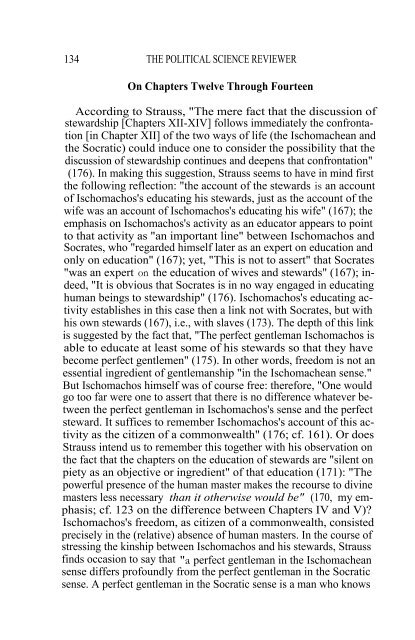Strauss on Xenophon's Socrates Xenophon's Socratic Discourse: An ...
Strauss on Xenophon's Socrates Xenophon's Socratic Discourse: An ...
Strauss on Xenophon's Socrates Xenophon's Socratic Discourse: An ...
Create successful ePaper yourself
Turn your PDF publications into a flip-book with our unique Google optimized e-Paper software.
134 THE POLITICAL SCIENCE REVIEWER<br />
On Chapters Twelve Through Fourteen<br />
According to <str<strong>on</strong>g>Strauss</str<strong>on</strong>g>, "The mere fact that the discussi<strong>on</strong> of<br />
stewardship [Chapters XII-XIV] follows immediately the c<strong>on</strong>fr<strong>on</strong>tati<strong>on</strong><br />
[in Chapter XII] of the two ways of life (the Ischomachean and<br />
the <strong>Socratic</strong>) could induce <strong>on</strong>e to c<strong>on</strong>sider the possibility that the<br />
discussi<strong>on</strong> of stewardship c<strong>on</strong>tinues and deepens that c<strong>on</strong>fr<strong>on</strong>tati<strong>on</strong>"<br />
(176). In making this suggesti<strong>on</strong>, <str<strong>on</strong>g>Strauss</str<strong>on</strong>g> seems to have in mind first<br />
the following reflecti<strong>on</strong>: "the account of the stewards is an account<br />
of Ischomachos's educating his stewards, just as the account of the<br />
wife was an account of Ischomachos's educating his wife" (167); the<br />
emphasis <strong>on</strong> Ischomachos's activity as an educator appears to point<br />
to that activity as "an important line" between Ischomachos and<br />
<strong>Socrates</strong>, who "regarded himself later as an expert <strong>on</strong> educati<strong>on</strong> and<br />
<strong>on</strong>ly <strong>on</strong> educati<strong>on</strong>" (167); yet, "This is not to assert" that <strong>Socrates</strong><br />
"was an expert <strong>on</strong> the educati<strong>on</strong> of wives and stewards" (167); indeed,<br />
"It is obvious that <strong>Socrates</strong> is in no way engaged in educating<br />
human beings to stewardship" (176). Ischomachos's educating activity<br />
establishes in this case then a link not with <strong>Socrates</strong>, but with<br />
his own stewards (167), i.e., with slaves (173). The depth of this link<br />
is suggested by the fact that, "The perfect gentleman Ischomachos is<br />
able to educate at least some of his stewards so that they have<br />
become perfect gentlemen" (175). In other words, freedom is not an<br />
essential ingredient of gentlemanship "in the Ischomachean sense."<br />
But Ischomachos himself was of course free: therefore, "One would<br />
go too far were <strong>on</strong>e to assert that there is no difference whatever between<br />
the perfect gentleman in Ischomachos's sense and the perfect<br />
steward. It suffices to remember Ischomachos's account of this activity<br />
as the citizen of a comm<strong>on</strong>wealth" (176; cf. 161). Or does<br />
<str<strong>on</strong>g>Strauss</str<strong>on</strong>g> intend us to remember this together with his observati<strong>on</strong> <strong>on</strong><br />
the fact that the chapters <strong>on</strong> the educati<strong>on</strong> of stewards are "silent <strong>on</strong><br />
piety as an objective or ingredient" of that educati<strong>on</strong> (171): "The<br />
powerful presence of the human master makes the recourse to divine<br />
masters less necessary than it otherwise would be" (170, my emphasis;<br />
cf. 123 <strong>on</strong> the difference between Chapters IV and V)?<br />
Ischomachos's freedom, as citizen of a comm<strong>on</strong>wealth, c<strong>on</strong>sisted<br />
precisely in the (relative) absence of human masters. In the course of<br />
stressing the kinship between Ischomachos and his stewards, <str<strong>on</strong>g>Strauss</str<strong>on</strong>g><br />
finds occasi<strong>on</strong> to say that "a perfect gentleman in the Ischomachean<br />
sense differs profoundly from the perfect gentleman in the <strong>Socratic</strong><br />
sense. A perfect gentleman in the <strong>Socratic</strong> sense is a man who knows

















